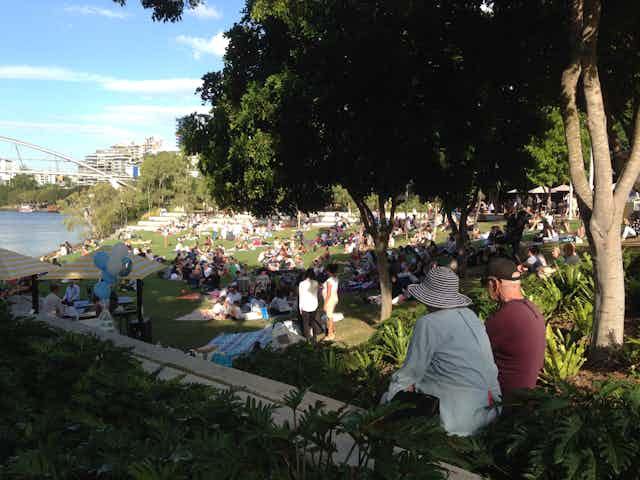The environmental movement is shifting away from focusing solely on raising awareness about environmental issues. Many environmental agencies and organisations now also aim to connect people with nature, and our new research suggests daily doses of urban nature may be the key to this for the majority who live in cities.
Every year in the United Kingdom the Wildlife Trusts run the 30 Days Wild campaign. This encourages people to carry out a daily “random act of wildness” for the month of June. The International Union for Conservation of Nature recently launched its #NatureForAll program, which aims to inspire a love of nature.
This shift in focus is starting to appear in environmental policy. For example, the UK’s recent 25-year environment plan identifies connecting people with the environment as one of its six key areas. Similarly, in Australia, the state of Victoria’s Biodiversity 2037 plan aims to connect all Victorians to nature as one of two overarching objectives.
The thinking behind such efforts is simple: connecting people to nature will motivate them to act in ways that protect and care for nature. Evidence does suggest that people who have a high nature connection are likely to display pro-environmental attitudes and behaviours.
Looking beyond the park
What is less clear is how to enhance an individual’s nature connection – that is feeling that they are a part of nature. Over half of all people globally, and nine out of ten people in Australia, live in urban environments. This reduces their opportunities to experience and connect with nature.
Our new study may offer some answers. A survey of Brisbane residents showed that people who experienced nature during childhood or had regular contact with nature in their home and suburb were more likely to report feeling connected with nature.
The study used a broad definition of urban nature to include all the plants and animals that live in a city. When looking to connect urban residents with local nature we need to take a broad view and look “beyond the park”. All aspects of nature in the city offer a potential opportunity for people to experience nature and develop their sense of connection to it.

The study also looked at the relationship between childhood and adult nature experiences. Results suggest that people who lack childhood experience of nature can still come to have a high sense of nature connection by experiencing nature as an adult.
There have been focused efforts on connecting children to nature, such as the Forest Schools and Nature Play programs. Equal effort should be given to promoting adult nature experiences and nature connection, particularly for people who lack such experiences.
The benefits of nature experience
We still have much to discover about how an individual’s nature connection is shaped. We need a better understanding of how people from diverse cultural and social contexts experience and connect to different types of nature. That said, we are starting to understand the important role that frequent local experiences of nature may play.
In addition to boosting people’s sense of nature connection, daily doses of urban nature deliver the benefits of improved physical, mental and social wellbeing. A growing evidence base is showing that exposure to nature, particularly in urban environments, can lead to healthier and happier city dwellers.
Robert Dunn and colleagues have already advocated for the importance of urban nature experiences as a way to bolster city residents’ support for conservation. They described the “pigeon paradox” whereby experiencing urban nature, which is often of low ecological value – such as interactions with non-native species – may have wider environmental benefits through people behaving in more environmentally conscious ways. They proposed that the future of conservation depended on city residents’ ability to experience urban nature.
As new evidence emerges we need to build on this thinking. It would seem that the future of our very connection to nature, our wellbeing and conservation depend on urban people’s ability to experience urban nature.


